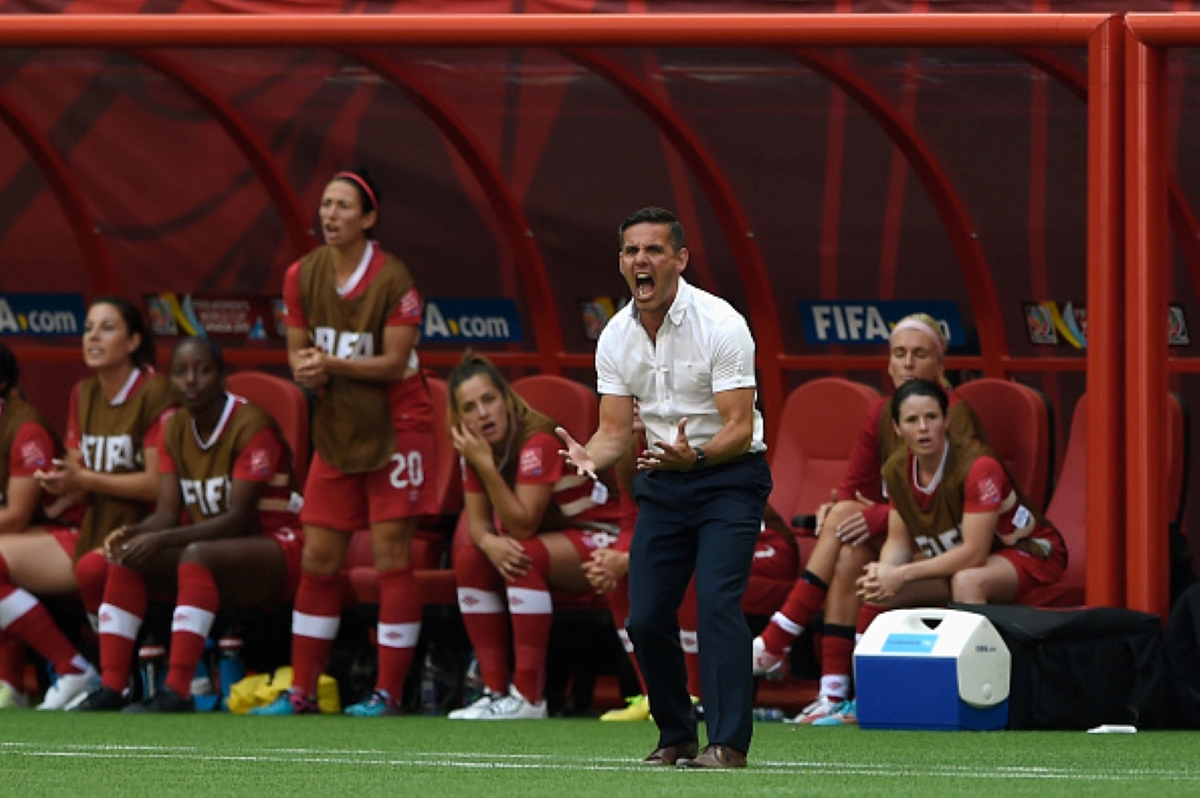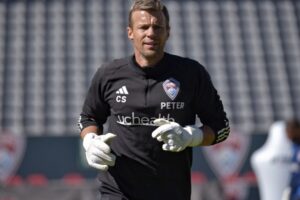When John Herdman took over the CanWNT, they were at one of the lowest lows in its national team’s history. The CanWNT did not earn a single point in the 2011 FIFA Women’s World Cup and lost all three games in their group stage. Something needed to change and Herdman was that change.
John Herdman and His Ever-Lasting Legacy With the CanWNT (2011-2018)
John Herdman: His Childhood and Professional Life Before the CanWNT
John Herdman was born in Consett, County Durham, England, and was the second child in his family. Herdman was living in public housing and he got in trouble a lot as a youngster (source: Speakers Spotlight):
“I was fighting all the time as a youngin’,” Herdman says. “I had a bit of my granddad’s genes.”
This feisty nature almost got Herdman killed as he was almost beaten to death (source: Bruce Arthur, columnist of the Toronto Star). After that, Herdman looked at changing his life, he started coaching at the youth academy of Sunderland and lecturing at University. He would then get his first chance to prove himself outside of England in New Zealand. Three years after working in New Zealand, he was hired by the New Zealand Football Federation. Then in 2006, he became the head coach of the New Zealand women’s football team, nicknamed the Football Ferns.
He would coach the Football Ferns in the 2008 Summer Olympics, as well as the 2007 and the 2011 FIFA Women’s World Cup. He also took a Māori saying while in New Zealand. Kristy Hill, then the captain of the Football Ferns, said this about Herdman (source: Tony Smith of Stuff):
“He said to us, ‘if you can’t see it with your heart, you won’t be able to see it with your eyes’.’’ Hill says that for Māori “the unseen is just as important as the seen. If you don’t lead with your heart, you won’t fully gasp what’s right in front of you.”
John Herdman: How He Changed the Team?
There were many things that John Herdman did. Three though will be highlighted in this article. The first thing he said was that “Being Good” is something he mentioned in his Ted Talk:
“Not only when people are watching, great people do it when nobody was watching are you.”
Herdman would describe being good not just at work, but off work as well. Obviously, this was not the only reason why the team was able to make a dramatic improvement, but it was one of the major reasons. The second point is how Herdman brought the team together. After having a disastrous FIFA World Cup outing in 2011, Herdman was able to bring the team together as said by Karina LeBlanc in Daniel Squizzato’s article:
“We were knocked down after the World Cup, we fell down,” goalkeeper Karina LeBlanc told the CBC at the time. “John came in and he said: ‘What do you guys want?’ We said, ‘We want a gold medal.’”
As a result, the CanWNT would win Gold in the Pan American Games just a month after having a disastrous FIFA World Cup campaign. The last part though is probably the most important. It is Herdman’s “four pillars” (source: Canadian Press) philosophy, which is physical, technical/tactical, mental, and social/emotional. Alex Hodgins, who was working with the CanWNT at the time, was the brains behind this as stated in the Canadian Press article:
“What we’re trying to do is just teach them how they react mentally … How quickly they get stressed and then how quickly they can manage that and get back into a calm state,” said Hodgins. “So, all we’re trying to do is have them aware of how to take control of the moment and when a stresser comes, how to regain control quickly so they can be at their best under their own control.”
Success at the Summer Olympics – 2012 Summer Olympics
The CanWNT’s success at the Summer Olympics is what made Herdman one of the best head coaches in the CanWNT national team’s history. The interest in the sport really started to take off in the 2012 Summer Olympics. Diana Matheson talked about scoring that goal that gave the CanWNT their first-ever bronze medal (source: Doug Smith of the Toronto Star):
“I have no idea what happened,” said Matheson, whose goal — incredibly — came on Canada’s only shot on goal for the game. “I can’t remember it, I think the ball came down the left and I was in the right place at the right time. “The ball was right there, the net was basically open, it definitely was in slow motion . . . it feels unreal right now.”
It was an amazing game that gave the CanWNT their first-ever medal in their national team’s history. What also will be remembered was their heroic game against the USWNT where they lost 4-3 in extra time, despite Christine Sinclair scoring a hat-trick. It also left a mark in the CanWNT’s history and sparked interest in the game as Eva Havaris mentioned in her interview with Last Word on Soccer back in 2021.
Success at the Summer Olympics – 2016 Summer Olympics
Canada would go on to win another bronze medal in 2016 in Rio de Janeiro. They had an impressive group stage performance winning all three of their games, including against top sides like Germany and Australia. Unfortunately, Germany would get their revenge in the semi-finals against the Canadians winning that game 2-0. Still, the CanWNT still got a bronze, by defeating the host nation, Brazil, by a score of 2-1.
These two medals came in between the 2015 FIFA Women’s World Cup in Canada. While the World Cup was not a great success for Canada, it did help grow the game in this country. Most notably, the first game against China at Commonwealth Stadium in Edmonton drew 53,058 fans.
Ultimately, Herdman left the women’s program to try and improve the men’s program. However, his legacy will not be forgotten. He took the national team to its highest-ever ranking of fourth in the world. A feat that has not been repeated despite the CanWNT winning the Gold Medal in Tokyo 2020.
READ MORE: The 2021 CanWNT Year Review – The Best Year Ever
John Herdman and Christine Sinclair
What might be most apparent though is Herdman’s and Sinclair’s relationship and friendship. This is what Sinclair said about Herdman when comparing the 2012 Summer Olympics and the 2011 FIFA Women’s World Cup squad (source: Yahoo Sports):
“There’s a lot of the same players but [John] has completely changed our team and completely changed each individual player,” said Sinclair. “And with him as our head coach, anything is possible.”
Congrats Christine, well earned and thoroughly deserved. https://t.co/uuKlE9Nv5a
— John Herdman (@coachherdman) January 17, 2022
The respect is mutual as Herdman congratulated Sinclair on winning “The Best FIFA Special Award.” When Herdman was head coach of the CanWNT, he and Sinclair were seen as front and centre of the Canadian national team. With Herdman leaving in 2018, he has now made a mark on the CanMNT, he undoubtedly changed the culture of soccer in Canada forever.
READ MORE: The CanWNT 2022 Year Review: A Year That Finished Off Strong






